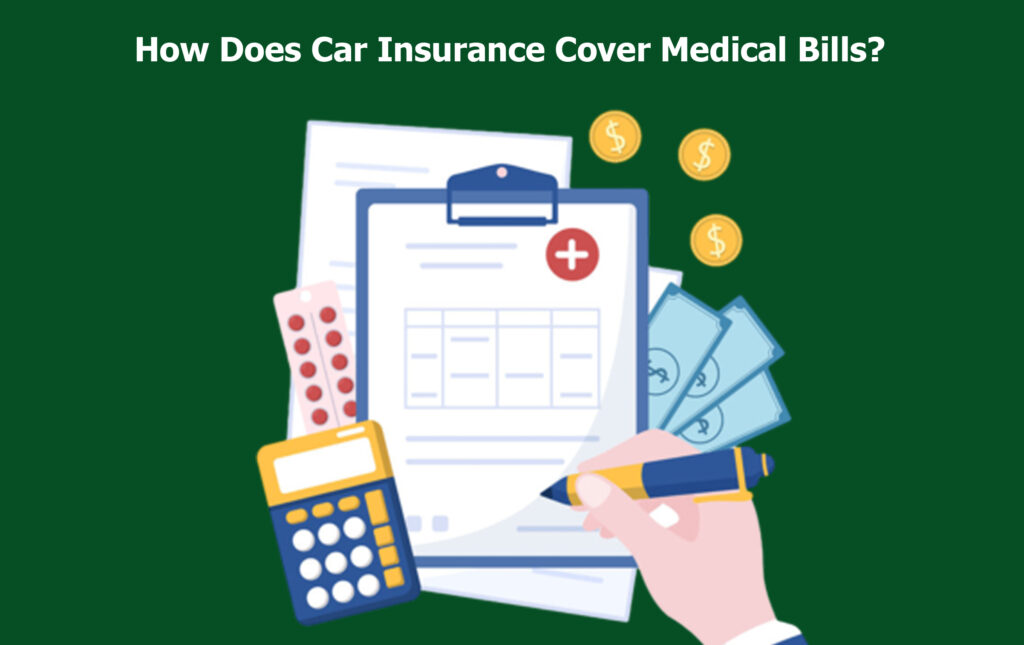Does car insurance cover medical bills? How? Most car accidents can result in serious injuries that lead to unexpected and very expensive medical bills. Now, most people fully understand that auto insurance helps pay for vehicle repairs or liability claims.

However, many are unsure of how it applies to medical expenses. The reality is that your car insurance can provide substantial coverage for medical bills resulting from an accident.
However, it depends on your policy and your state laws, whether you’re the driver, passenger, or even a pedestrian.
Unfortunately, medical costs after a crash can include everything from ambulance rides and emergency room visits to long-term rehabilitation and surgery.
Is There A Limit To How Much My Car Insurance Will Pay?
Yes, there is. Each policy has its own coverage which has its own limits, which can be found in your insurance policy. Furthermore, understanding how car insurance covers medical expenses is very important for anyone on the road.
Different types of coverage come into play, including Medical Payments (MedPay), Personal Injury Protection (PIP), Bodily Injury Liability, and Uninsured/Underinsured Motorist Coverage.
Hence, knowing what each covers and how to access the benefits can help you avoid financial hardship after an accident.
Medical Payments Coverage (MedPay)
Also known as MedPay, Medical payments coverage is an optional feature that’s available in most auto insurance policies. This type of coverage helps pay for medical expenses resulting from a car accident, regardless of who was at fault.
Furthermore, MedPay is very useful because it kicks in immediately and can cover out-of-pocket costs before other insurance takes over.
Some of the costs MedPay covers include:
- Emergency room visits
- Hospital stays
- X-rays and diagnostic tests
- Surgery costs
- Ambulance services
- Rehabilitation and physical therapy
- Funeral expenses (in some cases)
What’s more, MedPay generally comes with low coverage limits (e.g., $1,000 to $10,000) and is designed to act as a financial cushion before your health insurance steps in.
Bodily Injury Liability Coverage
Most coverage options help you cover your medical bills. However, other coverage options like the Bodily Injury Liability (BIL) covers the medical expenses of others if you’re found at fault for an accident.
This coverage doesn’t just pay your bills, but it protects you from being personally responsible for someone else’s injuries. Some of the expenses this coverage covers include:
- Medical expenses for other drivers or passengers
- Legal fees if you’re sued for damages
- Emergency treatment and ambulance fees
- Ongoing medical treatment and rehabilitation
Most states require minimum bodily injury liability coverage, but these limits may not be enough for severe injuries. You may want to purchase higher limits to better protect yourself financially.
Personal Injury Protection (PIP)
Personal Injury Protection is fully required in the no-fault insurance states and it offers broader coverage than MedPay. Additionally, it covers medical expenses, lost wages, essential services, and sometimes even funeral costs. PIP pays out regardless of who caused the accident. Some of the expenses it covers include:
- Medical bills (ER, surgery, prescriptions, etc.)
- Rehabilitation and therapy
- Lost wages due to injury
- In-home care or essential services
- Funeral expenses if necessary
What’s more, the coverage limits of PIP vary by state and insurer. In many cases, PIP coverage is primary and pays first, before your health insurance kicks in.
Uninsured and Underinsured Motorist Coverage
Uninsured/Underinsured Motorist Coverage helps cover your medical expenses if you’re hit by a driver who has no insurance or insufficient coverage to pay your bills. The expenses UM/UIM covers include:
- Lost wages if injuries prevent you from working
- Your passengers’ medical expenses
- Your medical bills
- Pain and suffering (depending on your policy)
This coverage is especially important in areas with a high rate of uninsured drivers. Also, it offers an added layer of protection and helps prevent you from bearing the financial burden caused by another person’s negligence.
Frequently Asked Questions
What Type Of Car Insurance Will Cover My Medical Bills?
Medical Payments Coverage (MedPay), Personal Injury Protection (PIP), and Uninsured/Underinsured Motorist Coverage can cover your medical bills depending on your location and policy type.
Does My Health Insurance Cover Car Accident Injuries?
Yes, health insurance can cover injuries. However, it usually acts as secondary coverage after your auto insurance pays its portion.
What If I Don’t Have MedPay Or PIP?
If you don’t carry MedPay or PIP, you’ll need to rely on your health insurance or seek compensation through a lawsuit if someone else is at fault.



